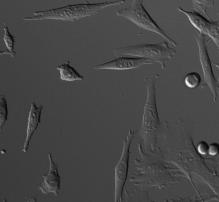|
Size: 1420
Comment:
|
← Revision 12 as of 2019-11-27 04:31:13 ⇥
Size: 952
Comment:
|
| Deletions are marked like this. | Additions are marked like this. |
| Line 3: | Line 3: |
| [[https://woldlab.caltech.edu/images/STG_C2_20x_5m_12h.webm|{{https://woldlab.caltech.edu/images/C2_small.gif|C2C12 timelapse|height=151,width=116}}]] A substantial biological challenge is to understand the regulation and execution of developmental decisions that lead from multipotential, undifferentiated precursor cells to their specialized differential products. In the Wold lab at the California Institute of Technology, we are interested in several interrelated aspects of this problem, and we also work to develop new methods for studying it. The particular cell lineage problem we study begins with the specification of mesoderm in early development and continues to the final differentiation of skeletal muscle or cardiac muscle in the fully developed animal. To study this process we use the mouse as our experimental system. Molecular-level analyses use cell culture model systems and transgenic mice. These projects include studies of in vitro and in vivo protein-DNA interactions and of factors that amplify or suppress expression activity. Computational approaches involve the development of algorithms for use in large-scale gene expression analysis and the construction of a simulator framework for regulation in muscle development. | [[https://woldlab.caltech.edu/images/STG_C2_20x_5m_12h.webm|{{https://woldlab.caltech.edu/images/C2_small.gif|C2C12 timelapse|height=151,width=116}}]] The Wold lab studies how cell identity is regulated in mammalian development, regeneration and aging. Our approach is anchored in genome science, aiming to work out how differentiation pathways are encoded in DNA and animated in the transcriptome. We develop new technologies and are actively using some of them to help build the international reference transcriptome and regulatory element databases. In a series of collaborative partnerships, we are increasingly focusing on the genomics of human disease states that include Alzheimer’s dementia, cancer, and Mendelian musculoskeletal disorders. |
| Line 5: | Line 5: |
| = News = | |
| Line 7: | Line 6: |
| <<MonthCalendarTopList(days=120,page=WoldLabNews)>> | |
| Line 9: | Line 8: |
| [[ WoldLabNews | Edit News ]] | /* = News = */ /* <<MonthCalendarTopList(days=120,page=WoldLabNews)>> */ /* [[ WoldLabNews | Edit News ]]*/ |
Welcome to the Wold Lab
 The Wold lab studies how cell identity is regulated in mammalian development, regeneration and aging. Our approach is anchored in genome science, aiming to work out how differentiation pathways are encoded in DNA and animated in the transcriptome. We develop new technologies and are actively using some of them to help build the international reference transcriptome and regulatory element databases. In a series of collaborative partnerships, we are increasingly focusing on the genomics of human disease states that include Alzheimer’s dementia, cancer, and Mendelian musculoskeletal disorders.
The Wold lab studies how cell identity is regulated in mammalian development, regeneration and aging. Our approach is anchored in genome science, aiming to work out how differentiation pathways are encoded in DNA and animated in the transcriptome. We develop new technologies and are actively using some of them to help build the international reference transcriptome and regulatory element databases. In a series of collaborative partnerships, we are increasingly focusing on the genomics of human disease states that include Alzheimer’s dementia, cancer, and Mendelian musculoskeletal disorders.
 Wold Lab
Wold Lab